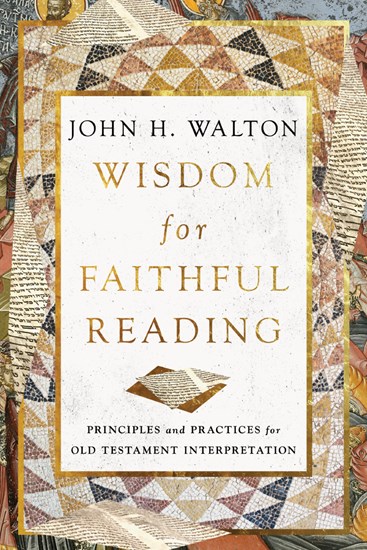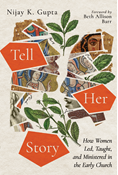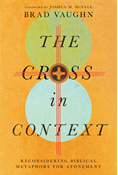
|
Wisdom for Faithful Reading
paperback
|
- Length: 248 pages
- Dimensions: 6 × 9 in
- Published: April 25, 2023
- Imprint: IVP Academic
- Item Code: A0487
- ISBN: 9781514004876
-
Other Retailers:
Amazon*
*affiliate partner
The church has too often lost its way in reading the Old Testament for lack of sound principles of interpretation. When careless habits get us off track, we can lose sight of what the Bible is really saying, derailing our own spiritual growth and even risking discredit to God’s word.
We need a consistent approach to give us confidence as faithful interpreters. In Wisdom for Faithful Reading, the trusted Old Testament scholar John Walton lays out his tried-and-true best practices developed over four decades in the classroom. His principles are memorable, practical, and enlightening, including:
- The Bible is written for us, but not to us.
- Reading the Bible instinctively is not reliable and risks imposing a foreign perspective on the text.
- More important than what the characters do is what the narrator does with the characters and what God is doing through the characters.
- Not everything has a "biblical view."
Along with identifying common missteps, Walton's insights point the way to stay focused on what the Old Testament text communicated to its original audience—and what it has to say for us today. When we submit ourselves to be accountable to the authors' intentions we experience the true authority of Scripture, and faithful reading fuels a faithful life.
Using numerous examples across the breadth of the Old Testament and its genres, Walton equips thoughtful Christians to read more knowledgeably, to pay attention to God’s plans and purposes, to recognize good interpretations, and to truly live in light of Scripture. You may never read the Old Testament the same way again.
"Evangelical pastors and church leaders will appreciate John H. Walton's Wisdom for Faithful Reading. Irenic and thoughtful, Walton introduces principles for how to read the Christian Old Testament faithfully. Anyone who reads this book will come away with a better sense of how to read Scripture and an appreciation for its beauty and richness."
"Those who have longed to sit in John Walton's classroom but are unable to do so need look no further. Wisdom for Faithful Reading distills over four decades of his Old Testament research and his reflection on responsible interpretation into a scholarly-yet-accessible volume. Exhibiting his trademark attention to ancient Near Eastern backgrounds, Walton argues for key interpretive principles and the importance of rhetorical strategy and genre in interpreting the Old Testament. His deep respect for biblical authority shines through as he guides teachers and pastors to responsibly interpret the Old Testament in a way that will ultimately equip the church to honor and glorify God."
CONTENTS
List of Figures and Tables
Preface
Acknowledgments
Part I. General Principles
Section A: Introduction
1. One Quest
2. Two Caveats
3. Three Essential Commitments
4. Four Fundamental Concepts for Interpretation
5. Five Principles for Faithful Interpretation
Section B. General Bible
6. A Text Cannot Mean What It Never Meant
7. The Bible Is Written for Us but Not to Us
8. Reading the Bible Instinctively Is Not Reliable and Risks Imposing a Foreign Perspective on the Text
9. Literal Reading Means Being Accountable to the Ancient Author’s Literary Intentions
10. We Are Accountable to the Author’s Literary Intentions, Which Constitute the Affirmations of Scripture
11. A Genre Discussion Must Precede an Authority Conversation
12. All Translation Is Interpretation
13. Words That Are Roughly Comparable in Two Languages Often Carry Different Nuances
14. In a Hearing Dominant Culture There Are No Books or Authors as We Know Them, and "Book" Is the Last Step, Not the First
15. The Old Testament is Not About Jesus, but It Drives Us to Jesus
16. The Holy Spirit Cannot Be Used as an Appeal to Authority
17. Not Everything Has a "Biblical View"
Part II: Genre Guidelines
Section A: Pentateuch
18. Creation Is More About Order Than Material
19. The Seventh Day Is the Most Important of the Creation Days
20. Covenant Is More About Yahweh's Presence and Kingship Than About Law, Promise, or Salvation
21. Torah Is More About Instruction That Cultivates Wisdom Than Legislation That Results in Law
22. Torah Is Not Establishing an Ideal Social System but Is Speaking Wisdom into Israel's Social System
Section B: Narrative
23. Reality Is Bigger Than History
24. We Have to Understand a Text Literarily Before We Can Understand It Historically
25. We Cannot Get Behind the Literary Veil
26. More Important Than What the Characters Do Is What the Narrator Does with the Characters and What God Is Doing Through the Characters
Section C: Wisdom and Psalms
27. Wisdom Is the Pathway to Order
28. Proverbial Sayings Are Generalizations, Not Promises
29. Psalms Commends Prayer but Does Not Command Prayer
Section D: Prophecy and Apocalyptic
30. Prophecy Is More About Revealing God's Plans and Purposes Than Revealing the Future
31. Prophecy Is Not Prediction
32. Apocalyptic Is Not Prophecy
33. In Apocalyptic Literature, the Visions Are Not the Message, but the Occasion for the Message
34. Fulfillment Is Distinct from Message
Part III: A Way Forward
Section A: Characteristics of Faithful Reading
35. Reading Scripture Well
36. Five Tendencies to Avoid
Section B: Living Life
37. Living Life in Light of Scripture
Appendix
FAQs
Scripture Index













